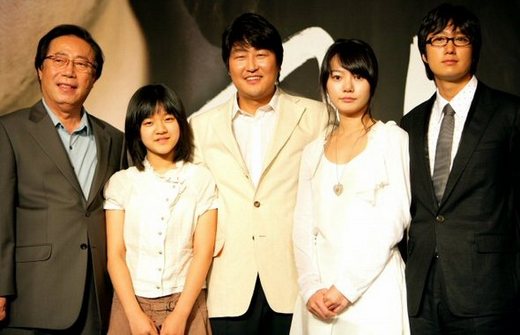Posted on : Jun.10,2006 12:03 KST
Modified on : Jun.10,2006 13:42 KST
 |
|
Song Kang-ho, center, and Bae Doo-na, second from right, cast of the film The Host, pose for the camera. Yonhap News
|
The amount of money Korean films earn in Japan is dropping rapidly. In 2004 they earned US$40 million and in 2005 they earned US$75 million, but so far this year sales have been less than half of what they were at this point last year. It's embarrassing to think of all the hype and excitement over
Hallyu, the "Korea wave."
If you look at the domestic market the situation it gets even more serious. Of all the people who saw movies in theaters in the month of January, 77.8 percent saw Korean films. In February 68.4 percent saw Korean films. In March 66.3 percent saw them, in April 45.8 percent, and in May, 33.9 percent. Compare that to how 65 percent of Korean moviegoers saw foreign films in May.
Some say the reason is because film companies have resisted putting big works on the market while everyone is interested in the World Cup. However, there were 32.8 percent more moviegoers in April 2005 than there were in April of last year, meaning that even amidst the excitement over the 2005 World Cup, Koreans still eagerly went to theaters.
The problem is to be found in quality. The reason new records were set for January and February is because crowds flocked to see "The King and the Clown" (
Wangui Namja) and a couple of other films. Most films failed to even earn what they'd spent on production. There weren't many of such quality that you felt bad when they failed. The reason the popularity of Korean film is ebbing is because of an overdependence on actors that are popular because they're part of that "Korea wave."
Some say part of the problem is that at big "multiplex" theaters, Hollywood films are given four of five screens during prime time slots while Korean films are shown at odd hours and then pulled after a couple of weeks. You can criticize those theaters for their commercialism, but you cannot tell them to keep films running when hardly anyone is going to see them. It's not like theaters are organizations fighting for noble causes.
The future is a bigger problem. Most theaters already satisfied the vastly reduced "screen quota" in the first quarter of the years. Now they can relax and run Hollywood blockbusters, which perform well at the box office, in the second half of the year. There are plenty of such foreign films waiting in line. "The Host" (
Goemul) and "Korean Peninsula" (
Hanbando) are the only Korean films that you can have any hope in right now.
You cannot blame it all on the "screen quota" reduction. The crisis is in part because the film industry has been hastily imitating Hollywood. At some point the industry started devoting itself to making viewers easily amused, through a dependence on money and big stars. Subsequently, Korean film is seen as being the closest in Asia to the language of Hollywood. How can it compete like that? They way for Korean movies to survive will be to produce works that are not like those from Hollywood.






